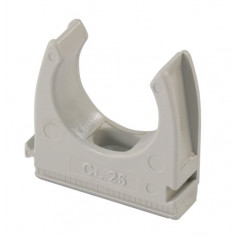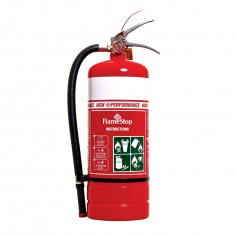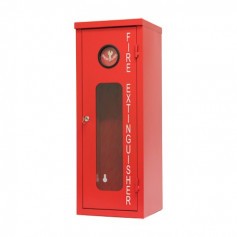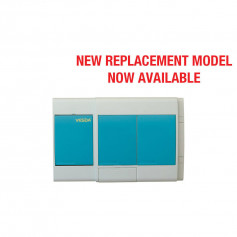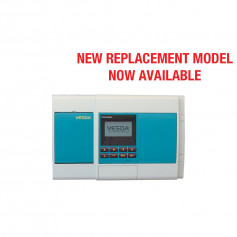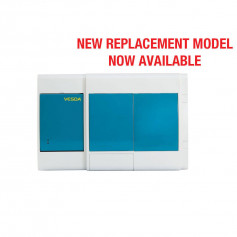VESDA Laser Plus
- Portable Fire Equipment
- Portable Fire Extinguishers
- Mobile Fire Extinguishers
- Fire Extinguisher Vehicle Brackets
- Fire Extinguisher Cabinets & Covers
- Fire Extinguisher Servicing Tools & Consumables
- Fire Blankets
- Fire Hose Reels
- Fire Hydrant Landing Valves & Equipment
- Hoses, Nozzles & Adapters
- Lay Flat Hoses
- Hose Reel Tails
- Hose Nozzles
- Branch Pipes
- Storz Forged Aluminium Adapters
- Storz Cast Aluminium Adapters
- Storz Cast Aluminium Hydrant Couplings
- NSW/MFB Hydrant Couplings & Adapters
- CFA Hydrant Couplings
- QLD Hydrant Couplings
- BIC Hydrant Adapters & Couplings
- Washers
- Lay Flat Tools & Service
- Lay Flat Hose Cabinets
- Anti-Tamper Device
- Extinguisher Spare Parts
- Portable Extinguisher Parts
- Mobile Extinguisher Parts
- ABE 30 & 50kg Parts
- ABE 70 & 90kg Parts
- Purple K 30 & 50kg Parts
- Purple K 70 & 90kg Parts
- BE 30 & 50kg Parts
- BE 70 & 90kg Parts
- AFFF 30L & 50L Parts
- AFFF 70 & 90L Parts
- Alcohol Resistant 30L & 50L Parts
- Alcohol Resistant 70L & 90L Parts
- Fluorine Free 30 & 50L Parts
- Fluorine Free 70 & 90L Parts
- CO2 22kg Parts
- CO2 45kg Parts
- Wall Brackets
- Extinguisher Gauges
- Pull Pins
- Valve Stems & Valves
- Valve Seats & Washers
- Neck O' Rings
- Dip Tubes
- Springs
- Hoses
- Handles
- Portable Extinguisher CO2 Parts
- Nozzles, Valves & Adapters
- Rivets
- Mobile Extinguisher CO2 Parts
- Recharge Equipment
- Sirens
- Knapsacks
- Anti-Tamper Device
- AS1851 Testing Equipment
- Solo 365 Test Kit & Accessories
- Solo Kits
- Testifire Kits
- Smoke & Heat Heads
- TruTest Smoke Detector Sensitivity Kits
- Smoke Cans & Capsules
- Smoke Bombs & Smoke Pens
- Poles
- Battery Charger & Batons
- Removal Tools
- Accessories
- Universal Flame Detector Testers
- Scorpion Remote Detector Testers
- Digital Multimeters
- Speaker Testing Equipment
- Battery Function Testers
- Cyclone Canless Air Systems
- Digital Light Meters
- Ultrasonic Liquid Level Test Kits
- Extinguisher Service Tools
- Measuring Scales
- Fire Detection Systems
- Addressable Fire Alarm Systems
- Vigilant MX1 Addressable Panels
- MX1 Addressable Fire Panels
- AS1668 Controls and Gas Controls for MX1
- Addressable Detection & 850EMTK Programmer
- Addressable Modules and Field Devices
- Graphic Monitoring Software - XLG Client Server
- Vigilant Empty Cabinets & Battery Boxes
- IP Interface Networking
- MX Hazardous Detectors / Devices
- Documentation and Manuals
- FlameStop Addressable Fire Alarm Systems
- EST3X Addressable Fire Alarm Systems
- Vigilant MX4428 & F4000 Addressable Systems
- Simplex 4100ESi Fire Panels
- Vigilant MX1 Addressable Panels
- Emergency Warning Systems
- QE20 EWCIE and QE90 EWIS
- Occupant Warning Systems
- Evacuation Speakers
- AS ISO 7240.24 Flush Mount Speakers
- AS ISO 7240.24 Low Profile Flush Mount Speakers
- AS ISO 7240.24 Surface Mount Speakers
- AS ISO 7240.24 Horn Speakers
- AS ISO 7240.24 Sound Projectors
- Horn Speakers
- Ceiling Ball Speakers
- Pendant Ball Speakers
- Speaker Accessories & Cages
- Vandal Resistant Speakers
- Speaker Grills
- Megaphone
- Speaker Testing Equipment
- Visual Alarm Devices
- WIP Phones & WIP Cabinets
- Manual Call Points & Accessories
- VOX Speech Intelligibility Test Kits
- VESDA ASD Detectors
- Conventional Fire Alarm Systems
- Batteries
- Cable
- Smoke, Heat, Co Alarms & Accessories
- AS1851 Testing Equipment
- Ancillaries
- Power Supplies
- Miscellaneous Tools & Items
- Gas Panel Accessories
- Flame Detection
- Baseline Data & Termination Cabinets
- Stat-X Aerosol Fire Suppression
- OSID Emitters & Imagers
- Conveyor System Detection
- Anti-Tamper Device
- Addressable Fire Alarm Systems
- VESDA & FAAST FLEX ASD
- VESDA & FAAST FLEX Detectors
- VESDA Life Expectancy 2015
- Xtralis AS1851.2012 Maintenance
- VESDA LCD Programmer & High Level Interfaces
- VESDA-E Backward Compatibility Table – Firmware Versions
- Filters & Spare Parts
- VESDA Software
- Pipe and Fittings
- Automatic Air Purging System
- 19" Rackmount Configurations
- Gas Detection for VESDA
- VESDA Remote Displays
- Power Supplies
- VSM4 Configuration & Monitoring Software
- VESDA Documentation & Manuals
- VESDA Life Expectancy 2015
- Xtralis AS1851.2012 Maintenance
- VESDA-E Backward Compatibility Table – Firmware Versions
- VESDA Product Manuals & Data Sheets
- VESDA Technical Tips
- VESDA Maintenance & Troubleshooting
- VESDA Design & Commissioning
- VESDA Industry Documents
- VESDA Aspirated Smoke Detection for Impulse (Jet) Fans in Carparks
- VESDA Refrigerated Cold Storage Facilities - Design Guide & Information
- VESDA Case Studies
- VESDA Movies
- Smoke Bombs & Smoke Pens
- FAAST FLEX Documentation & Manuals
- Water & Mechanical
- Fire Sprinklers
- Valves
- Butterfly Valves cw Monitor Grooved
- Brass Butterfly Valves cw Monitor BSP
- Outside Screw and Yoke Gate Valve Grooved
- Outside Screw and Yoke Gate Valve Flanged
- Pump Connectors
- Swing Check Valves Grooved
- Alarm Valves - Grooved
- Waste and Test Valves
- Water Motor Alarm Gongs
- Retard Chambers
- Mini Ball Valves Gauge Cocks
- Lockable Ball Valves
- Brass Swing Check Valves
- Brass Spring Check Valves - Brass Spindle
- Brass Y Strainers
- Brass Gate Valves Threaded
- Pressure Relief Valves
- Sprinkler Control Valve Assembly’
- Wafer Check Valves
- Lugged Butterfly Valve c/w Lever Handle + Gear Operator
- Double Check Valves
- Globe Throttling Valves Grooved
- Pressure Reducing Valves
- Bermad FP450 60 Tank Infill Valves
- Float Valves
- Solenoid Valves
- Brass Fittings
- Roll Groove
- Rigid Angle Pad Couplings
- Flexible Couplings
- Fast Connect Couplings
- Reducing Couplings
- Transition Coupling
- Standard Radius 90 Degree Elbows
- Short Radius 90 Degree Elbows
- Standard Radius 45 Degree Elbows
- Standard Radius 22.5 Degree Elbows
- Standard Radius 11.25 Degree Elbows
- Standard Radius Tees
- Short Radius Tees
- Reducing Tees
- Concentric Reducers GxG
- Concentric Reducers GxT
- End Caps
- End Caps with Eccentric BSP
- Mechanical Tees Grooved
- Mechanical Tees BSP Thread
- Grooved x Flanged Adaptors
- Grooved Hinged x Flange Adaptors
- Bull Head Tees Grooved
- Hydrant Elbows Grooved
- Grooved x BSP Adaptors
- HYDRANT LANDING VALVES
- FIRE HOSE REELS
- HOSES, NOZZLES & ADAPTORS
- Flexible Droppers
- Steel Pipe
- Gal Mal
- 90 Degree Elbows
- Tees
- 90 Degree Elbows MF
- Hex Nipples
- Sockets
- Square Plugs
- Unions Brass Seat
- Reducing Bushes
- 90 Degree Reducing Elbows
- Reducing Tees
- Reducing Hex Nipples
- Reducing Sockets
- Bull Nose Tees
- Service Tees
- Sprinkler MF Adaptors
- Table D Flange x BSP Thread
- 45 Degree Elbows
- 45 Degree Elbows MF
- End Caps
- Crosses
- Hangers
- 1 Piece Channel Clips
- 2 Piece Channel Clips
- Pear Bands
- Pear Bands HDG
- Nut Clips M10
- Nut Clips M12
- Mounting Plates
- Angle Brackets
- Beam Clamps
- Shallow Saddles
- Deep Saddles
- Twist Clips
- Wrap Around Pipe Clamps
- Purlin Clips
- Threaded Rod ZP
- Threaded Rod HDG
- Rod Joiners ZP
- Rod Joiners HDG
- Rod Cutters
- Channel and Angle
- Cantilever Brackets
- Medium Duty Saddles UN15
- Medium Duty Double Bolted Clamps UN16
- Medium Duty Yoke Clamps UN18
- Pipe Stand Clamps cw 50Nb Half Socket
- U Bolts
- 2 Piece Stainless Steel 316 Stand Off Bracket
- Mechanical Fasteners
- Monitor Switches
- Gal Steel
- Stainless Steel
- Consumables
- Valve Gaskets
- Flange Full Face Gaskets Table E
- Ring Gaskets
- Fibre Full Face Gaskets Table E
- Angus
- Bermad
- Chisolm
- Globe
- Grinnell Wormald
- Mather and Platt
- Matthew Hall
- Padde
- Reliable
- Shurjoint
- Star Model F Quell Guardian
- Tyco Central F
- Tyco Gem
- Tyco DV5
- Victaulic
- Viking
- Walter and CIE
- Waste and Test Kits
- Dorot Diaphragm
- Cometal Diaphragm
- Dobbie Dico Dual Booster
- Hydrant Landing Valves
- Pressure Gauges
- Traffolyte Signs and Stickers
- Tools
- Hydrant
- Hydrant Landing Valve Roll Groove
- Hydrant Landing Valve BSP
- Dual Hydrant Booster Roll Groove
- Dual Hydrant Booster BSP
- Single Point Booster Roll Groove
- Hydrant Booster Cabinets
- Booster H Patterns
- Dual Hydrant Risers
- Tank Suction Adaptor
- Dual Hydrant Booster Roll Groove High Pressure
- Quad Hydrant Booster Roll Groove
- Quad Hydrant Booster Roll Groove High Pressure
- Jacking Pumps and Accessories
- PPE
- Passive Fire
- Anti-Tamper Device
- Exit & Emergency Lighting
- Suppression Systems
- Fire Fighting Foam
- Passive Fire Equipment
- HYDRANT LANDING VALVES
- Cabinets
- Hardware & Fasteners
- Signage & Stickers
- Custom Engraved Sign
- Custom Printed Sign
- Custom Vinyl Cut Sign
- Signs and Labels
- Extinguisher Location Signs
- Fire Blanket Location Signs
- Extinguisher Charts/Cards
- Identification Signs
- Hose Reel Location Signs
- Fire Exit Signs
- Fire Door Signs
- Misc Signs
- First Aid Signs
- WIP Signs
- Offences Signs
- Alarm Signs
- Hydrant Signs
- Sprinkler Signs
- Fire Signs
- Pressure Test Stickers
- Extinguisher Pictographs
- Extinguisher Labels
- Water & Mechanical
- Pipe Markers
- Engraved Signs
- Hydrant Signs
- Hose Reel Signs
- Fire Hose Reel & Fire Signs
- Hydrant Pump & Valve Signs
- Sprinkler System Signs
- Fire Alarm Panel Signs
- Gas System Signs
- EWIS Panel Signs
- Electrical Signs
- Hazardous Signs
- Custom Block Plans
- Customised Signs
- Fire Safety Door Signs
- Cabinet Signs
- Commonly Used Signs
- CO Fire Detectors Installed Engraved Signs
- Signs for VADs and VWDs
- Vinyl Cut Lettering
- Block Plans & Evac Plans
- Snap Frames
- Cabinet Stickers
Latest News
 Protecting Cold Storage Facilities using VESDA ASD – FlameStop TV Episode 50
Protecting Cold Storage Facilities using VESDA ASD – FlameStop TV Episode 50
 FlameStop Wins Johnson Controls 2024 APAC Open Globe Award for Outstanding Sales Excellence
FlameStop Wins Johnson Controls 2024 APAC Open Globe Award for Outstanding Sales Excellence
 New Quick-Connect Metal Grille Flush Mount Speaker - FlameStop TV Episode 49
New Quick-Connect Metal Grille Flush Mount Speaker - FlameStop TV Episode 49
 Universal Flame Simulator Test Kit - FlameStop TV Episode 48
Universal Flame Simulator Test Kit - FlameStop TV Episode 48
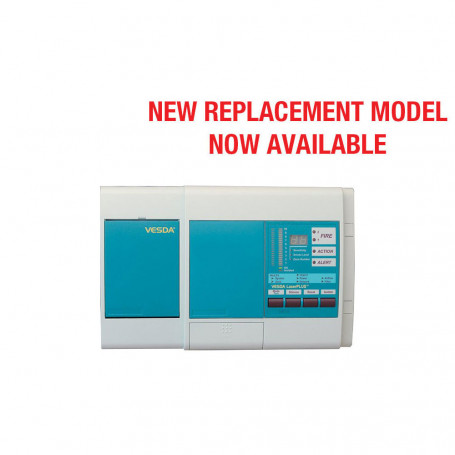 View larger
View larger VESDA LaserPLUS - DISPLAY
P-VLP-002
DISCONTINUED – REPLACEMENT MODEL NOW AVAILABLE
P-VLP-002 replaced by P-VEP-A10-P
Panel Configuration: Blank Panel, Blank Panel, Display
The VESDA VLP detector is the central element of the VESDA ASD product range.
Using unique detection principles, the VLP has an alarm sensitivity range of 0.005%–20% obscuration/m (0.0015%–6.25% obscuration/ft). The VLP is classed as a “Very Early Warning Smoke Detector”, which means that it detects fire at the earliest possible stage and reliably measures very low to extremely high concentrations of smoke.
Features
- Laser based absolute smoke detection
- 4 configurable alarm levels
- 4 inlet pipes
- Up to 2,000m²
- High efficiency aspirator
- Airflow supervisor per inlet pipe
- Dual stage air filter
- 7 programmable relays
- VESDAnet communication
- AutoLearn™ & Referencing
- Event log
- Available in various configurations
Availability date:
DISCONTINUED – REPLACEMENT MODEL NOW AVAILABLE
P-VLP-002 replaced by P-VEP-A10-P
Panel Configuration: Blank Panel, Blank Panel, Display
The VESDA VLP detector is the central element of the VESDA ASD product range.
Using unique detection principles, the VLP has an alarm sensitivity range of 0.005%–20% obscuration/m (0.0015%–6.25% obscuration/ft). The VLP is classed as a “Very Early Warning Smoke Detector”, which means that it detects fire at the earliest possible stage and reliably measures very low to extremely high concentrations of smoke.
Features
- Laser based absolute smoke detection
- 4 configurable alarm levels
- 4 inlet pipes
- Up to 2,000m²
- High efficiency aspirator
- Airflow supervisor per inlet pipe
- Dual stage air filter
- 7 programmable relays
- VESDAnet communication
- AutoLearn™ & Referencing
- Event log
- Available in various configurations
Downloads
TECHNICAL DATA SHEETS
GUIDE
OTHER
Product Information
The VESDA VLP detector is the central element of the VESDA ASD product range.
Using unique detection principles, the VLP has an alarm sensitivity range of 0.005%–20% obscuration/m (0.0015%–6.25% obscuration/ft). The VLP is classed as a “Very Early Warning Smoke Detector”, which means that it detects fire at the earliest possible stage and reliably measures very low to extremely high concentrations of smoke.
Air is drawn into the VLP through a network of air sampling pipes by a high efficiency aspirator. Each inlet pipe has an airflow sensor that monitors airflow changes in the pipes. Air is exhausted from the VLP and may be vented back into the protected zone. Inside the VLP, a sample of air is passed into the laser detection chamber. Ultra-fine air filtration provides very clean air to protect the optical surfaces inside the detector from contamination.
The detection chamber uses a stable Class 1 laser light source and carefully positioned sensors to achieve the optimum response to a vast range of smoke types. The status of the detector, and all alarm, service and fault events, are transmitted to displays and external systems via VESDAnet.
Features
- Laser based absolute smoke detection
- 4 configurable alarm levels
- 4 inlet pipes
- Up to 2,000m²
- High efficiency aspirator
- Airflow supervisor per inlet pipe
- Dual stage air filter
- 7 programmable relays
- VESDAnet communication
- AutoLearn™ & Referencing
- Event log
- Available in various configurations



